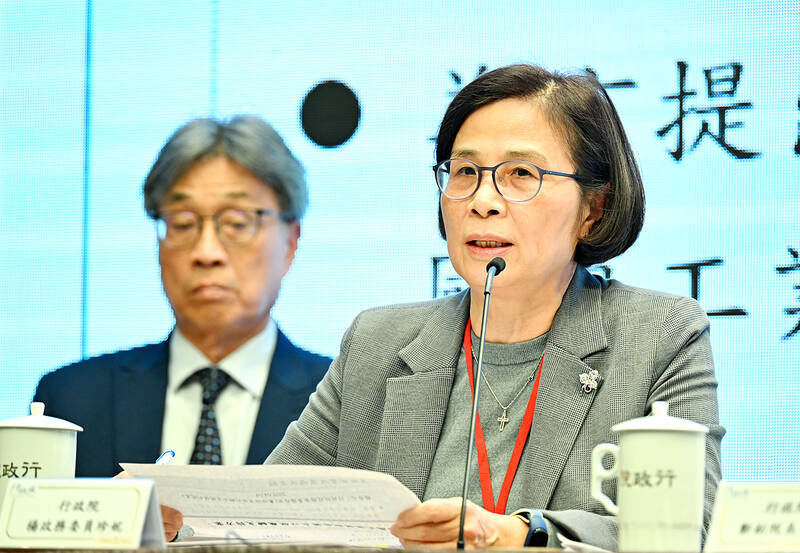Minister Without Portfolio Yang Jen-ni (楊珍妮), head of the Executive Yuan’s Office of Trade Negotiations, on Thursday met with US Trade Representative Jamieson Greer in South Korea, Vice Premier Cheng Li-chiun (鄭麗君) said in Taipei yesterday, without providing details on what specifically was discussed.
Yang and Greer met on the sidelines of the APEC trade ministers’ meeting in Jeju, Cheng said, adding that the two hoped to hold another round of negotiations on tariffs.
The encounter was the first between the two sides since Taiwan last month met twice with US officials to discuss tariffs, the first via videoconference on April 11 and the second in person at the end of the month.

Photo: Taipei Times
Cheng and Yang led the Taiwanese delegation at the second meeting.
Describing last month’s talks as “constructive,” Cheng said they covered tariffs, non-tariff barriers and economic security, and that the two sides were willing to reinforce bilateral trade and economic cooperation based on mutual benefits.
The talks were held following US President Donald Trump’s rollout early last month of what he called “reciprocal” tariffs on trading partners that targeted countries with large trade surpluses with the US.
Goods from Taiwan, for example, were hit with a 32 percent import duty.
A week later, Trump announced a 90-day pause on the higher punitive rates to allow negotiations with countries for lower rates, while assessing a 10 percent duty against most economies.
Although some countries have pushed back against Trump’s tactics, Taiwan has offered little overt resistance.
President William Lai (賴清德) has said that Taiwan has no intention of launching retaliatory measures and hoped to move toward a “zero tariff” arrangement with the US modeled on the US-Mexico-Canada Agreement.
Cheng said that Taiwan’s only goal in the trade negotiations was to lower tariffs and turn risks into opportunities to advance local industrial development.
In terms of a possible tariff threatened by Trump on semiconductors and other products under Section 232 of the US Trade Expansion Act of 1962, Cheng said that Taiwan has given opinions to Washington on the levy.
If a tariff were imposed on Taiwan’s semiconductors, Taiwanese manufacturers would slow down their investments in the US market, which could interrupt semiconductor supplies, she said.
Trump has said that Taiwan “stole” the chip industry from the US and threatened to impose a tariff of up to 100 percent on semiconductors made in Taiwan.
Last year, Taiwan had a trade surplus with the US of US$73.9 billion, rising sharply from US$47.8 billion in 2023, largely due to increased shipments of artificial intelligence-related products, such as chips and servers.

The Coast Guard Administration (CGA) yesterday said it had deployed patrol vessels to expel a China Coast Guard ship and a Chinese fishing boat near Pratas Island (Dongsha Island, 東沙群島) in the South China Sea. The China Coast Guard vessel was 28 nautical miles (52km) northeast of Pratas at 6:15am on Thursday, approaching the island’s restricted waters, which extend 24 nautical miles from its shoreline, the CGA’s Dongsha-Nansha Branch said in a statement. The Tainan, a 2,000-tonne cutter, was deployed by the CGA to shadow the Chinese ship, which left the area at 2:39pm on Friday, the statement said. At 6:31pm on Friday,

The Chinese People’s Liberation Army Navy’s (PLAN) third aircraft carrier, the Fujian, would pose a steep challenge to Taiwan’s ability to defend itself against a full-scale invasion, a defense expert said yesterday. Institute of National Defense and Security Research analyst Chieh Chung (揭仲) made the comment hours after the PLAN confirmed the carrier recently passed through the Taiwan Strait to conduct “scientific research tests and training missions” in the South China Sea. China has two carriers in operation — the Liaoning and the Shandong — with the Fujian undergoing sea trials. Although the PLAN needs time to train the Fujian’s air wing and

The American Institute in Taiwan (AIT) put Taiwan in danger, Ma Ying-jeou Foundation director Hsiao Hsu-tsen (蕭旭岑) said yesterday, hours after the de facto US embassy said that Beijing had misinterpreted World War II-era documents to isolate Taiwan. The AIT’s comments harmed the Republic of China’s (ROC) national interests and contradicted a part of the “six assurances” stipulating that the US would not change its official position on Taiwan’s sovereignty, Hsiao said. The “six assurances,” which were given by then-US president Ronald Reagan to Taiwan in 1982, say that Washington would not set a date for ending arm sales to Taiwan, consult

A Taiwanese academic yesterday said that Chinese Ambassador to Denmark Wang Xuefeng (王雪峰) disrespected Denmark and Japan when he earlier this year allegedly asked Japan’s embassy to make Taiwan’s representatives leave an event in Copenhagen. The Danish-language Berlingske on Sunday reported the incident in an article with the headline “The emperor’s birthday ended in drama in Copenhagen: More conflict may be on the way between Denmark and China.” It said that on Feb. 26, the Japanese embassy in Denmark held an event for Japanese Emperor Naruhito’s birthday, with about 200 guests in attendance, including representatives from Taiwan. After addressing the Japanese hosts, Wang